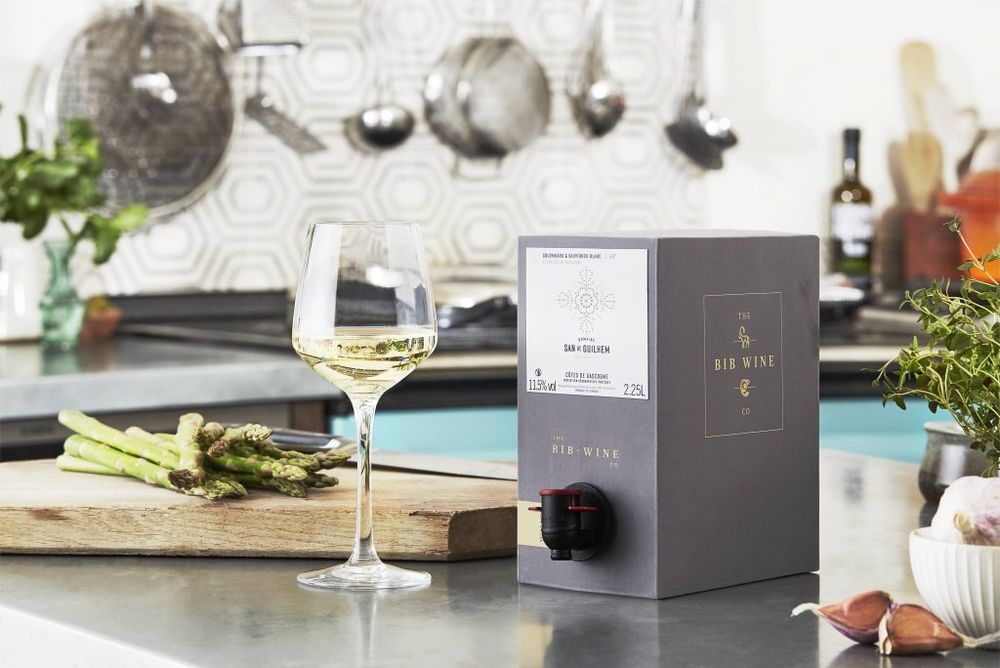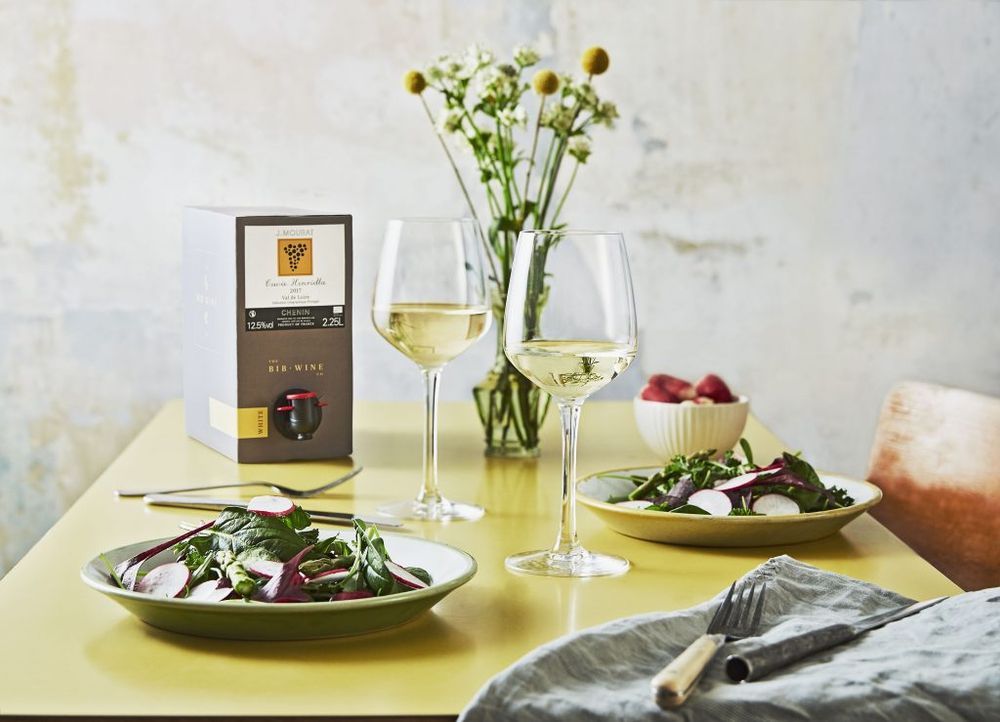When was the last time you tried a wine straight out of a bag-in-box? If you did what sort of expectation did you have? Justin Howard Sneyd MW explains why he believes we all need to re-think our attitudes to bag-in-box wine and when done right they can be a real match for bottled wine.
Justin Howard-Sneyd believes so much in the future of bag-in-box wine that he’s joined forces with four brothers and sisters to help set up a new business dedicated to bringing quality wine to discerning wine consumers in a format they believe its best days still lie ahead of it. The BIB Wine Company says its just as much about finding interesting, independent winemakers, making quality, terroir-driven wines as any other wine importer, just that it wants to supply them to its customers in a bag-in-box.
Founded by brothers and sisters of the Lea family, Oliver, Tom, Alex and Rebecca (now Roberts), they are working with Howard-Sneyd to help source the right wines, at the right standard to be suitable for their bag-in-box concept that they say offers six times a better carbon footprint than working with bottled wine.
Wines they now plan to sell to select restaurant and bar partners in the on-trade and direct to consumers either on a one off basis or as part of a wine club.
Here Justin Howard-Sneyd explains the concept behind it and why he is confident the time is right to re-think bag-in-box wines.

The BIB Wine Company wines says wines can be used for up to six weeks after opening
Commentators and critics in the world of wine, and wine business, have been predicting the demise (or decline) of the 75cl glass bottle for some time now.
Let’s face it, it is strange that we still drink wine from a vessel that represents the approximate lung capacity of the medieval glass blower’s lungs.
Seventy five cl may be about right for two people having dinner together on a weekend, but what when you only want a glass, or you want a red and your partner wants a white? What if you only take a glass or two out of a bottle, and travel / dinner / theatre / diet plans mean that the next occasion when you will need another glassful at home is a whole week later?
Many solutions have been presented, and all have found a small place in the market – the airline bottle, the half bottle, the single plastic glass with a peel-back lid – but nothing has taken off yet.
One of the obvious answers has been with us for 30 years – the bag-in-box.
So why hasn’t this format made inroads into the UK wine market? (In fact its share started to decline when the ‘half price promotion’ became a thing).
The answer is that our prior associations with bag-in-box in the UK have been with lowest common denominator generic wines of only average quality.
Quality and technology
But two things have changed.
One is that in Scandinavia, in a market that doesn’t allow price promotions, a four bottle wine box is typically sold at a decent discount to the regular price per bottle. So they are enormously popular. Around 60% of all volume sold in Sweden is in bag-in-box.
And this means that much more premium producers have been encouraged to look at the bag-in-box sector, and they have shown that good wine tastes great in a bag-in-box.
Secondly, technology has made it easier and easier to physically handle the shipping and filling of bag-in-box wines on a small scale.
No longer does a winemaker have to fill a 24,000 litre steel tanker with their precious wine, and wave goodbye while it makes its way to some wine factory in Germany or Newcastle, where hundreds of wines a week are pushed through the system and given the same identikit, safety first treatment.
Now, small, often organic, producers who have loving laboured over small batches of delicious wine can fill much smaller vessels that sit nicely on a pallet, and can be shipped on the normal wine transport network. They can be sent to a fellow winemaker in a small winery in the UK, who understands each individual wine, and tailors the filtration regime to the absolute minimum necessary, and uses as little sulphur as strictly necessary, to respect the lower sulphur levels used by organic producers.

Why now?
About six months ago, I was approached by four siblings from the Lea family of Suffolk, Oliver, Tom, Alex and Rebecca (who is now a ‘Roberts’). They had a dream that they could be the ones to open up the premium bag-in-box market in the UK, had founded The BIB Wine Company, and were looking for a founding partner to help find producers to work with, and select the wines.
Six months later, and after several trips to European wine fairs, organic wine events and visits to individual growers, we have pulled together a range of 12 wines to launch this month, including a wine of my own – Bee Pink – made with the help of Jean-Marc Lafage in the Roussillon – which I also sell in bottle at my website (new vintage arriving in May).

The BIB Wine Company team hope to bring quality independent producers to the trade in a different way
What have we learned?
Winemakers are really interested to supply us – it is a new route to market, and a premium one (we pay WAY higher prices than the standard ‘vrac’ price.)
Winemakers like having their label on the box, and being associated with the other growers in the range.
Every wine gets a lot of input from the winemaker as to how they would like it to be handled.
Now that we have packed them, we know that good wines DO taste great from a BIB!
There is a big market out there of engaged wine drinkers easily persuadable about the convenience, and the environmental benefits of BIB. The commentators and critics are keen to write about this revolution in Bag-in-Box quality.
Our London launch was at the end of last month and sales on the website will go live shortly, but please go for more information and to sign up here.
Join the revolution!
We also asked Oliver Lea how he sees the project working.
How are you looking to work with the trade?
Whilst our focus is on a direct to consumer model we’re keen to work with selected on-trade customers that fit with our ethos, especially as we see the combination of quality, lack of waste and environmental benefits as being very helpful to on-trade customers. We have no current intention to work with off-trade retailers, although may do so by exception.
Which channels do you see as being you main routes to market?
Direct to consumer model – online sales split between our subscription model and one off purchases. In terms of trade – selected on-trade customers (those with a focus on quality, low intervention and sustainability).
How are you handling the actual selling to the on-trade?
We are contacting businesses directly, or we can be contacted on info@bibwine.co.uk. We can conduct tastings on site. We only deliver in multiple of 8xBIBs per wine. We have no tie ins but will conversely will not offer lengthy credit terms. We have wines that are limited and seasonal in their supply, but can work with customers to ensure some continuity for certain periods of time using a sale/purchase agreement on a case by case basis.
Any takers yet?
We have a number of bookings for tastings in Bristol, Bath and London in the coming weeks, and will begin expanding our reach shortly. We have had very encouraging feedback from potential customers so far (with one or two having tasted at our events).
Average price points of wines you looking to work with?
Retail price – £8-15 per bottle equivalent. A small trade discount will apply.
- You can find out more about the BIB Wine Company here and Justin’s own website The Hive Consultancy here.
































